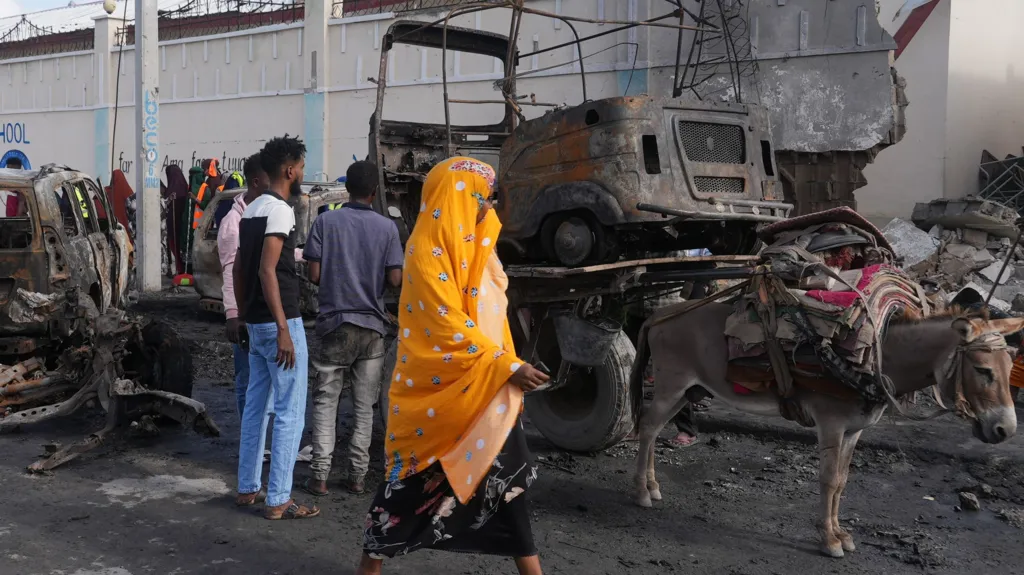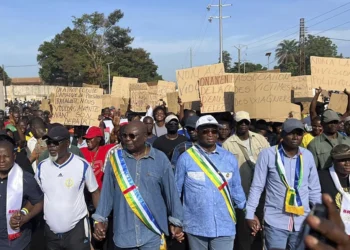In a devastating incident, a car bomb exploded outside a popular café in Somalia’s capital, Mogadishu, resulting in the deaths of at least nine individuals and injuring many others.
The attack occurred as patrons were engrossed in the final match of the Euro 2024 football tournament on television, the government confirmed.
On Monday, July 15, the al-Qaeda-linked militant group al-Shabab claimed responsibility for the deadly bombing.
The group made the announcement via a radio station affiliated with them, stating that the target was a venue frequented by security and government personnel during the evenings.
In the aftermath, an eyewitness recounted a harrowing tale of chaos and terror that unfolded before his eyes.
“We heard a loud, horrifying explosion during the first half of the game. Everyone had to figure out how to save themselves. I saw people in danger, injured people screaming for help, and others confused – it was terrifying.”
Mohamed Muse
Mohamed Yusuf, an official from the National Security Agency, reported on Monday that the death toll had risen to nine, revising the initial count of five fatalities given by authorities on Sunday night.
“Nine civilians were killed and 20 others wounded in the explosion,” Yusuf disclosed.
“There were many people inside the restaurant, most of them youth who were watching the football match, but thanks to God, most of them made their way out safely after using ladders to climb up and jump over the backside perimeter wall.”
Mohamed Yusuf
Dramatic images shared on social media captured the chaos, showing a massive fireball and thick plumes of smoke rising into the night sky as the blast tore through the bustling restaurant in central Mogadishu.
Police officer Mohamed Salad, who arrived at the scene shortly after the explosion, reported finding several bodies buried under the rubble.
The powerful bomb not only claimed lives but also destroyed ten cars and damaged several nearby buildings in a heavily secured area close to the presidential palace.

Al-Shabab, A Menace In Somalia
Al-Shabab, despite losing significant territory to Somali government forces and their allies, continues to orchestrate lethal attacks aimed at destabilizing the government.
For over 17 years, the group has waged a relentless campaign to overthrow the fragile central government in Mogadishu, frequently employing bombings and other violent tactics in the capital and beyond.
The Somali federal government relies heavily on support from foreign troops to maintain its hold on power.
A concerted effort involving local armed groups, an African Union force, and U.S. airstrikes has been launched to counter al-Shabab’s influence.
However, the offensive has faced numerous challenges, with the militant group recently claiming to have seized several locations in central Somalia.
In response to the persistent threat, Somalia has appealed to the African Union to delay the planned withdrawal of its forces from the country.
United Nations resolutions have called for the reduction of troop numbers in the African Union peacekeeping mission, known as ATMIS, to zero by December 31, transitioning security responsibilities to the Somali army and police.
The third phase of this drawdown was scheduled to see the departure of 4,000 ATMIS soldiers — out of a total of 13,500 — by the end of June.
However, Somalia’s government has requested that only 2,000 soldiers leave in June, with the remaining 2,000 to withdraw in September.
The Somali government faces multiple challenges beyond the militant threat. Prolonged drought, political fragmentation, and the emergence of autonomous regions further complicate efforts to stabilize the country.
READ ALSO: CalBank PLC Makes Remarkable Turnaround in the First Half of 2024





















